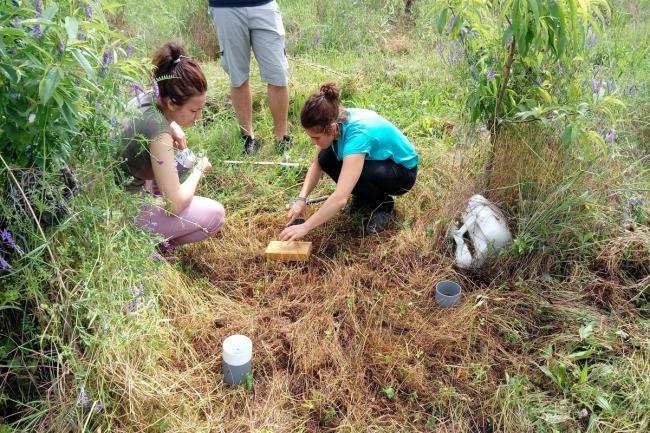Evaluation of carbon fluxes in agricultural terrains of Ferrara plain and the Modena Apennine and of sustainable strategies for carbon sequestration

The project is aimed to evaluate the carbon fluxes in different farms of the Ferrara plain and Modena Apennine in order to mitigate the SOM deterioration occurring in their solis. Results will provide the definition of new SOM quality indexes and the calculation of the carbon footprint of the production systems evaluating both the effects of diverse agricultural practices (conventional and innovative) and the importance of the pedo-climatic context for biological productions. The integration of the results will lead to delineate new carbon fluxes monitoring protocols and to identify “best practices” reconciling farm productivity and environmental sustainability.
The project will be developed in 9 synergic actions to be completed in a time span of 24 months. A first planning phase will be followed by multi-stage actions finalized to the cultivation of parcels with innovative agricultural practices. Soils, plants and gases outpouring from the soil will be properly characterized through advanced analytical methodologies with the aim of defining SOM quality indexes and parameters necessary for the calculation of the carbon footprint. The project will provide a focused training on the importance of SOM for the farmers, and a multi-level dissemination activity with the aim of increase the public consciousness on the importance of the agricultural sustainability.
The exploitation of agricultural soils through conventional techniques leads to a progressive deterioration of Soil Organic Matter (SOM) and loss of soil functionality, and constitutes one of the most important sources of greenhouse gases (GHG) among anthropogenic activities.
Noteworthy, the ongoing climatic changes represent an important factor for the SOM destabilization and the delineated scenario indicates future losses of agricultural productivity (COP21 Conference). In this framework, the UNFCC Convention indicated the importance of new agricultural approaches (Climate Smart Agriculture – CSA) as a tool to face the negative effects induced by climatic changes. Guidelines have to be defined in order to maintain food security, to improve sustainable agricultural productivity and to reduce GHG emissions. This is particularly relevant in the Mediterranean area as evidenced by a focus group of the European Innovation Partnership on Agricultural Productivity and Sustainability (EIP-AGRI).
Accordingly, The project intends to create a methodological tool that correlates the use of innovative and biological agricultural practices with the increase of quantity and quality of SOM and the soil carbon sequestration.
The project has a twofold objective proposing solutions to increase the soil functionality and productivity of the involved farms and to attribute a carbon footprint certification to their agricultural products. The main outcomes of the project on the involved farms will be useful for the:
- All the involved farms will benefit of a quantitative and qualitative study of the SOM and, by a dedicated training, they will increase the knowledge on the functionality and productivity of their soils in relation to SOM preservation;
- On the basis of the obtained results, the involved farms will benefit of dedicated suggestions for the best agricultural practices for in order to optimize/increase the SOMquantity and quality and to reduce GHG emissions;
- All the involved farms will benefit of the calculation of the carbon footprint, which will probably represent a mandatory certification of the environmental impact of the farms in the next future.
From these benefits the actual advantages for the companies may consist of:
- To consolidate the reputation of the farms with respect to the customers;
- To differentiate their products on the market;
- To increase the environmental performances;
- To identify agricultural practices characterized by lower GHG emissions and better SOM preservation.
| Titolo/Descrizione | Url | Tipologia |
|---|---|---|
|
Sito web del progetto
|
Sito web
|
|
|
I risultati di SaveSOC2 in rivista “Ecoscienza”
|
Materiali utili
|
|
|
I risultati di SaveSO2 in rivista “Terra e Vita”
|
Materiali utili
|
|
|
SaveSOC2, relazione divulgativa
|
Materiali utili
|
|
|
Relazione tecnica finale
|
Materiali utili
|
|
|
Video del progetto
|
Materiali utili
|